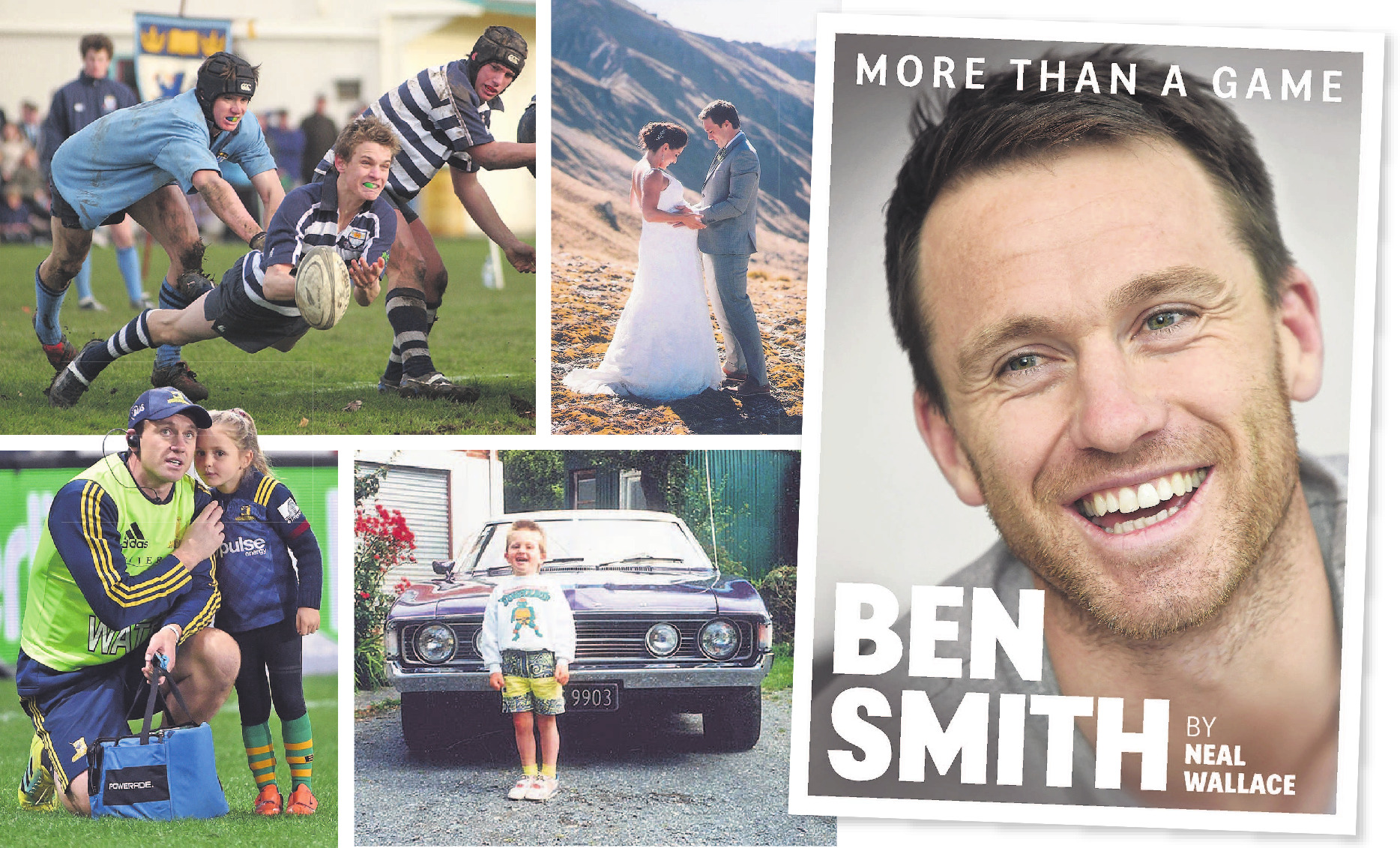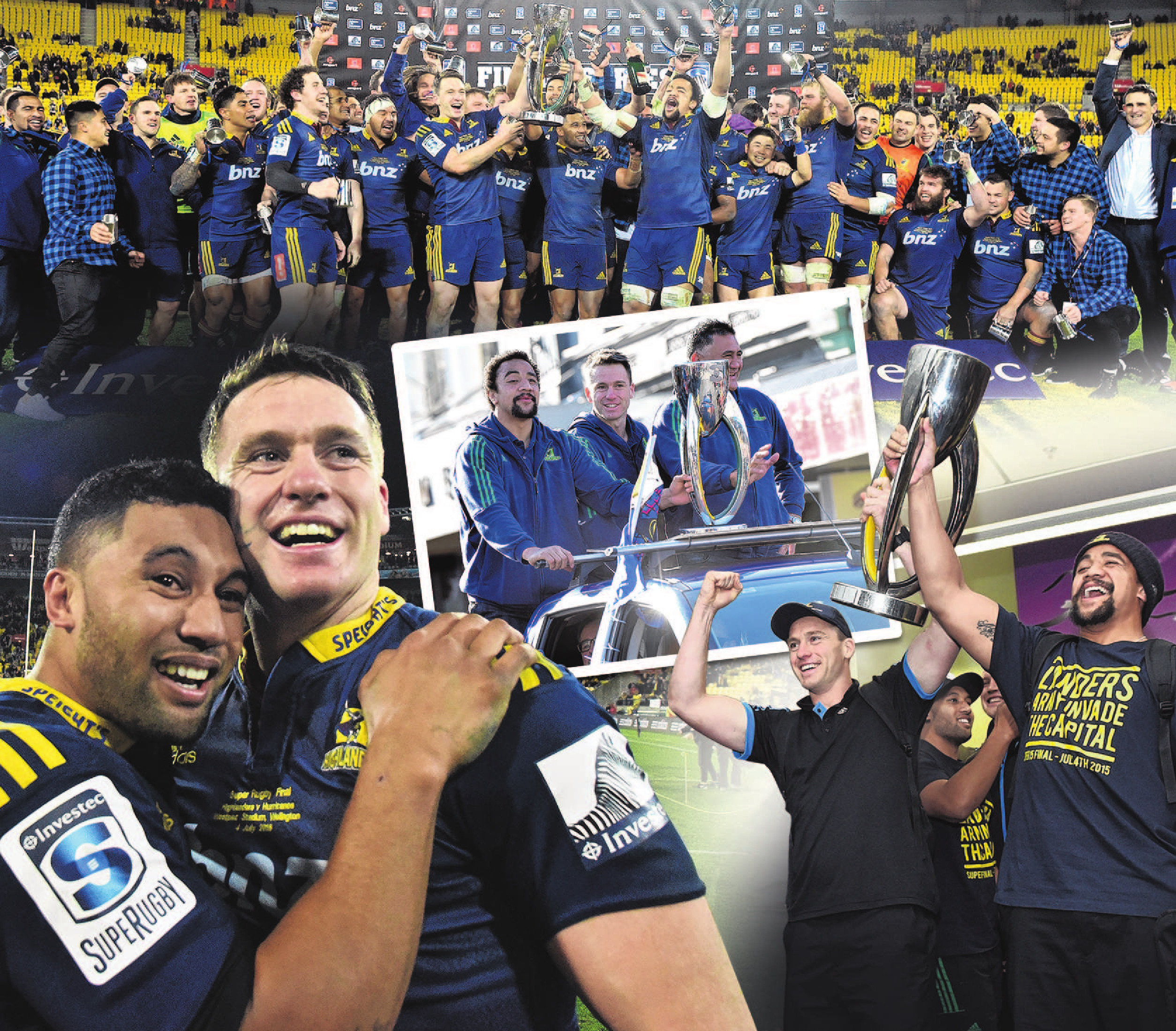
Certainly it covers 15 seasons of high-level rugby, but they are an adjunct to uncovering how Smith achieved international recognition by complementing his skills with determination, an unbridled love for the game, a commitment to training and a thirst for hard work. In this edited extract, Ben Smith shares his experience of that historic Highlanders title.
The 2015 Super Rugby season did not promise to be anything exceptional for the Highlanders. They had certainly made progress and, after qualifying for the 2014 finals, coach Jamie Joseph could see a foundation forming, built on confidence, values, character and a leadership group that had matured and commanded respect. "The 2014 season showed that with the right leadership you can achieve anything," he says.

Ben says the Highlanders’ forward pack that season showed Jamie’s ability to spot talent and grow players who did not yet have a reputation, but who worked hard, fitted the team’s culture and had complementary strengths.
"We had a very good backline, but our forwards were journeymen who played as a team," says Jamie. He would utilise the underdog tag - the fact that his uncelebrated forward pack had a point to prove.
The pack embraced that challenge, playing well above their station week after week to out-muscle more fancied teams and provide a platform for a backline that grew in confidence.
In the May 23, round-15 match against the Western Force in Perth, Ben joined Anton Oliver, Jimmy Cowan and Chris King in playing 100 matches for the Highlanders. Remarkably, since his debut in 2009 he had missed just four games, one of which was enforced.
The Highlanders were sailing along nicely among the competition’s frontrunners, until the ghosts of the previous season threatened to reappear after a below-par performance in the round-13 loss to the Lions in Johannesburg. A few drinks in a closed session at the hotel led to an impromptu excursion to a nightclub. The partygoers had agreed to return by team curfew, but things got physical when one player, prompted by teammates to leave, refused. The altercation escalated into a clash on the dancefloor, a bloody nose and a cracked lip. At a team disciplinary meeting the next day, several players were stood down. It proved something of watershed moment from which the team refocused, the next week demolishing the Cheetahs 45–24 at Bloemfontein. Two years after finishing second bottom, the Highlanders ended the 2015 regular season in fourth place, scoring 450 points and conceding 333. They then dispatched the Chiefs 24–14 in the qualifiers’ round in Dunedin, before travelling to Sydney for a semifinal match against the Waratahs.
The likelihood of the Highlanders and their team of no-names advancing further in the competition was dismissed by most rugby followers, who believed the result of the Allianz Stadium fixture was a fait accompli. The Sydney Morning Herald reminded readers that the Waratahs pack had 299 international test appearances between them, compared to none among the Highlanders’ eight. Waratahs player Jacques Potgieter tweeted he was looking forward to the "next two weeks", implying the team was already focused on the final. Being so publicly written off and dismissed provided rich material for the coaches, as well as leading to short team talks. In one address to his team ahead of the match, Jamie walked into the team room, held up a Sydney Morning Herald report dismissing any chance of a Highlanders’ victory, and simply said "F... them". He threw it on the table and walked out, leaving the players to read it. Copies of Jacques Potgieter’s tweet were plastered on the team room walls.
The critics had poked a bear and in response the team silenced them with a commanding performance. "Our forwards absolutely dominated that game," recalls Ben. They outplayed and outmuscled their much more fancied rival pack to lay a foundation for the backs and a 35–17 victory. In doing so, the Highlanders scored 20 unanswered points and crossed for five tries, while conceding just one.
The final was against the Hurricanes in Wellington, but even after the surprisingly easy victory in Sydney the critics remained unconvinced the Highlanders were serious title contenders, with the notable exception of the Otago Daily Times. "Believe", its sports pages trumpeted after the Sydney win. The Dunedin paper was a lone voice in the overwhelming media and public consensus that the All Blacks-laden Hurricanes needed to do little more than turn up to secure the title.

Ben says there was a growing belief among the squad that they could beat any team because everyone was playing for each other, and they all knew they would leave everything they had on the field.
Ben recalls finals week was enjoyable, a mix of strategy, tactics and humour. "I remember going into the final with this feeling that we were going to give it a really good nudge and possibly tip them up."
A match-day good luck text from friend Buxton Popoali’i prompted an uncharacteristic response from the normally reserved Ben. "I texted him back - and it was unlike me, but I said to Bucky, ‘I’ll see you after the game and we’ll have a drink out of the trophy’." He had a feeling the momentum the side had built in recent weeks was not yet spent. Co-captain Nasi Manu had a similar premonition in the week leading up to the match. "Nasi opened a fortune cookie at a Chinese restaurant that said he was going to win a big prize. He didn’t laugh it off. There was no doubt in his mind that we were going to win the title."
This confidence from the co-captains brought an edge to the team in the build-up, but there was further incentive to perform. The final was Nasi’s last game for the Highlanders and the much-loved team member wasn’t going to miss the match, even though his body was held together by tape and his right eye had been damaged in the match with the Waratahs. "There was hardly a part of his body not covered with tape, but part of our inspiration was to perform well for Nasi." There was further motivation when the Highlanders arrived at their Wellington hotel. Cricketing great Brendon McCullum had left a message on the whiteboard in the team room: "Someone’s got to win it, why not us?" Tactics going into the match were simple: if given a scoring opportunity, anyone in the team was to back their instincts and individual skills and have a go, "pull the trigger". They were urged to not over-think situations, but to trust team processes, their preparation and their teammates.
From the kick-off the game had the intensity of a test match as the two sides went toe-to-toe, punch for punch at a pace and intensity that lasted for the whole 80 minutes.
The teams prodded and probed, landing counterpunch for counterpunch. Heading towards halftime, the Highlanders were ahead 6-5 thanks to two Lima Sopoaga penalties to an unconverted 36th-minute Ma’a Nonu try. The Hurricanes could have been further ahead but for a 33rd-minute try-saving tackle by Ben on TJ Perenara, who was just 8m from the try line. That initiated a distinct momentum shift. Right on half time, man-of-the-match Elliot Dixon bulldozed through four tacklers for a try that, after what felt like a lifetime of deliberation by the television match official, was eventually awarded.
Soon after the game restarted, Waisake Naholo scored. Ben featured three times in the movement that switched from one side of the field to the other for Waisake’s try six minutes into the second half. But any hopes the Highlanders had the game secured were dashed by Beauden Barrett, who kept the Hurricanes in touch with three second-half penalties. With the visitors ahead by a narrow 18–14 margin heading into the final minutes, Lima Sopoaga was substituted by Marty Banks. "Marty came on and does what he normally does. He’s a tin arse," reflects Ben. "Three times he got into the pocket for a drop kick. The first two times his attempted kicks were thwarted, and he was forced to run, but the third time he knocked it over." The final score was 21–14 to the Highlanders. Having led the match from the start, the 2015 side had secured the franchise’s first title after 20 years of trying.
Speaking to reporters after the game, Ben was ecstatic and quite emotional. "We knew right from the start we had something different. Along the way people started to believe. We talked about brotherhood, all being good mates and just doing it for each other. We really wanted it, to do it for each other." Returning to the changing rooms, the team continued their celebrations, in moments that Ben has always treasured.
Because of what had been going on throughout the years but also the weeks leading up, when the final whistle blew it wasn’t just another win - it meant a lot to a lot of people. No matter what happened before or after, we were going to enjoy it. As Brownie would say, beer tastes better after a win. We enjoyed those beers for a few days. A highlight was the court post-match session run by Marc Ellis and Aaron Pene. Some good times celebrating, and we had a laugh. Something that also stuck out was in the middle of the court session, Jamie kicked the trophy over and said: ‘let’s get another one’.
Slowly, the enormity of what they had achieved finally dawned on Ben. "When I joined the club in 2009, we were bottom of the competition, struggling to win games and we slowly made our way up to be a team that can compete at the top level and win a competition. It was an awesome feeling, that we had done something against the odds." In the bars and restaurants of Wellington that night, Highlanders supporters outnumbered Hurricanes fans as the team joined fans, friends and family to celebrate. "It was one of those days I will never forget, an amazing time to be part of the Highlanders club and to finally have some silverware to put in the cabinet," says Ben. Shane Christie didn’t even get changed out of his playing gear as he headed into town with his teammates. "When we got back to our hotel it was chocker with family and friends. The Speight’s went down a treat."

The book
More Than a Game, by Neal Wallace, can be bought online at the ODT Store (www.store.odt.nz) and over the counter at any Otago Daily Times office.












